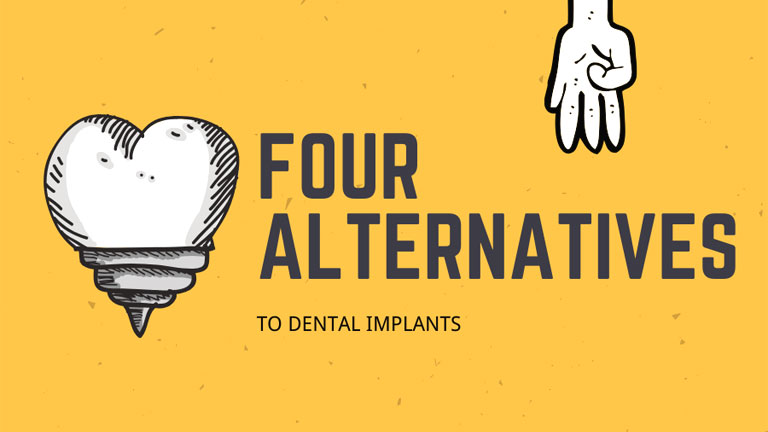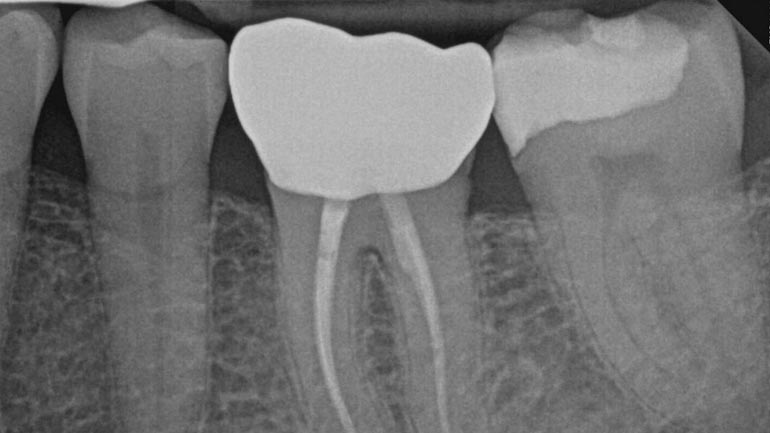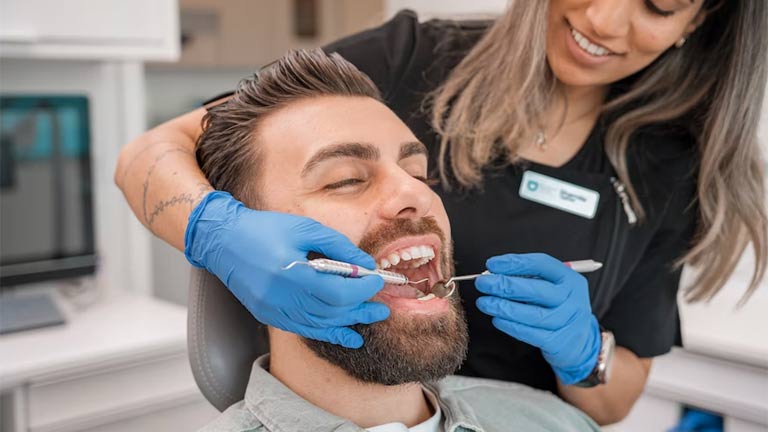
You’ve heard of dental implants, right? This popular procedure is great for people who are experiencing tooth loss. In the dental world, implants could be considered the greatest innovation in the field thus far.
However, dental implants are not for everyone. There are actually some very popular alternatives to dental implants. But what are they?
We’ll be discussing 4 different options in this article, listed below:
- Tooth-Supported Fixed Bridge
- Removable Partial Denture
- Removable Complete Denture
- Resin-Bonded Bridge
Before going into details, we’d like to introduce reasons why you may consider one of these alternatives as opposed to dental implants.
Why Choose an Alternative?
Dental implants are definitely a huge advancement in dentistry. So, why in the world would anyone choose an alternative? There are two main reasons why people go on a different route.
Reason #1: The Individual is not a Candidate for Dental Implants
The honest truth is that some people are just not eligible for implants. Safety comes first, and the big goal is to make sure you have a safe dental experience. There are some factors that can cause an increase in implant failure. Here are the factors:
- Receiving cancer treatments such as radiation or chemotherapy
- Medications that can negatively affect bone growth
- Being postmenopausal; having low estrogen levels
- Jawbone issues, such as low-density
- Having poor control over diabetes
- Having gum disease
- Being an alcoholic
- Over age 60
- Being a smoker
Reason #2: Dental Implants are too Expensive
The 4 alternatives we are about to discuss are far cheaper than dental implants. How much do you think you’ll pay for a single dental implant? We’ll tell you… just for one implant, you’ll spend somewhere in the ballpark of $4,000. And if you want a complete set of teeth to be replaced? You could spend up to 10X that amount: $40,000.
Are there any ways to reduce this cost? There sure are. For example, you could search for a dental school that will provide this procedure for you. It typically involves letting a dental student perform your implant surgery (while being supervised by a licensed professional). Aside from this, you could also submit an application for credit/financing.
Do any of these two reasons apply to you? If so, then it’s time for us to jump right into the alternatives to dental implants.
The 4 Best Alternatives to Dental Implants
Luckily, we’re here to help you figure out some other options that can treat you well. In this section, we’ll be explaining the alternatives to dental implants. And what benefits you can expect from these alternate options.
Alternative 1: Tooth-Supported Fixed Bridge
If you’re looking to get only 1 tooth replaced, then this may be the best option for you. There will be a fixed bridge, which is supported by your natural teeth.
The teeth on either side of your gap will come into play here. Both teeth lying adjacent to your gap will be crowned. These are called your anchor teeth, or abutment teeth. What’s the replacement tooth called? It’s known as a pontic and is fixed between your two crown teeth.
Fixed bridges are commonly made of gold. They can also be made of another precious metal alloy or porcelain. Sometimes the fixed bridge is made up of multiple materials. The goal is to create a natural look for your teeth.
So, what’s the downside of this alternative as opposed to a dental implant? Well… dental implants are self-supporting. But in the tooth-supported fixed bridge, you will need the support of your abutment teeth. Your abutment teeth will need to be ground down, which means removing healthy parts of your teeth.
What’s another downside? Your abutment teeth will be placed under more stress because they’ll be supporting your replacement tooth. You’ll have a greater risk of infection or decay with your abutment teeth.
As opposed to dental implants, fixed bridges also require more maintenance. The fixed bridge also will probably not last as long as a dental implant.
But let’s not get carried away with the negatives. Ready to learn about the benefits of a tooth-supported fixed bridge?
Benefits of Tooth-Supported Fixed Bridge
For starters, your tooth-supported fixed bridge will be crafted in a way where it looks completely natural. A highly-efficient dental technician will use sophisticated porcelains to pull this off. If your abutment teeth are decayed or discolored, the fixed bridge can improve their appearance.
But how about the treatment? Any benefits to that? The simple answer… absolutely. It’s a very straightforward procedure. The entire process can be completed in only two weeks. This is significantly less time than it takes for dental implant treatment. Also, the tooth-supported fixed bridge is far more affordable than implant surgery. You’ll be looking at somewhere between $700-$1,500.
Alternative 2: Removable Partial Denture
What exactly is a partial denture, anyway? It’s a removable object that can be held in place by your adjacent teeth. Or with clasps that go around your current chompers.
Some variations of partial dentures have precision attachments. This is where a denture attachment will clip onto a crown or a bridge. Removable partial dentures are usually made from acrylic. They can be strengthened by using a Cobalt chrome base. Some of these can be made from nylon as well.
Benefits of Removable Partial Denture
What’s the biggest benefit of removable partial dentures? It’s absolutely the price tag. This extremely affordable option will do just fine at hiding the gap between your teeth. You’ll be smiling and talking in confidence again, and without breaking the bank.
And guess what? Partial dentures can help improve your speech as well. Talk about a nice boost of self-esteem. It’s also possible to add false teeth onto this denture if you run into more tooth loss. The procedure is minimally invasive, so if you fear the dentist, you won’t have much to worry about in this case.
Alternative 3: Removable Complete Denture
This complete denture will be supported by your gums. It will be sitting in the area where your natural teeth used to be. Like the partial version, this version is affordable and minimally invasive. However, you may find some discomfort and instability if you take this route.
Complete dentures are typically very large, especially the upper portion. You may have trouble tasting your food while wearing these dentures. This is because it covers your upper palate. Also, some foods can’t be properly chewed with complete dentures.
You’ll need to use adhesives to keep your complete dentures from slipping around too much while you talk, eat, smile, etc. The constant movement can potentially cause soreness in your gums. You may also experience accelerated bone loss. It’s a good idea to keep all of this in mind before deciding on removable complete dentures.
Benefits of Removable Complete Denture
It’s not all negative, though. What’s a major benefit here? Of course, the cost is a lot more tolerable than dental implants. You’ll have your teeth replaced, and you’ll gain some confidence back. These dentures will support the muscles around your mouth, giving you your natural facial structure.
You’ll also gain the ability to eat and speak more clearly. Your overall nutrition will increase since you’ll be able to eat a bigger variety of food. This is a great affordable option if you’re looking to take a route that doesn’t involve surgery.
Alternative 4: Resin-Bonded Bridge
This is also known as a Maryland bridge. This alternative is basically suitable for your front teeth only. Why is that? It’s because these bridges could break if put under too much pressure. Your front teeth will have a lot less stress while biting into your food.
The resin-bonded bridge has what are called “wings” that fit on the backside of your adjacent teeth. The wings are also attached to your replacement tooth (pontic). This procedure is minimally invasive. But your Peoria AZ dentist may have to take a bit of tooth enamel away from your adjacent teeth. This helps the wings stick better.
This alternative can be made from numerous metal alloys. It could be made from zirconia as well. Or any other all-ceramic materials. You should note that resin-bonded bridges don’t last so long, as compared to dental implants. Resin-bonded bridges can be used as a temporary fix while awaiting the restoration of a missing tooth.
Benefits of Resin-Bonded Bridge
The big benefit here is the price. It’s cheaper to receive a resin-bonded bridge than it is for a tooth-supported fixed bridge. And it’s less invasive as well (teeth won’t need to be grounded down). As with the other alternatives, you’ll see an increase in your ability to eat, smile, and speak. The resin-bonded bridge also helps hold your adjacent teeth in place. Think of it as a retainer.
The Worst Option: Do Nothing About It
So you’ve got a tooth (or teeth) missing. You’ve decided to just let it be for now. No big deal, right?
It can develop into a pretty big deal. When you experience tooth loss, you immediately begin to lose your jawbone. The bone density will start to decrease. But why? It’s because, without a root, the bone won’t be stimulated by food consumption anymore. Chewing and biting help maintain your bone strength.
Within the first year of tooth loss, you’ll experience a 25% decrease in that specific width of bone in your jaw. There will be more deterioration over the next several years. That’s a pretty big deal.
In other words, you shouldn’t wait too long before giving your teeth some attention.
In Conclusion
Some people are just not able to get dental implant surgery. It could be due to the price. Or it could be due to health-related and lifestyle-related situations. Regardless, there are four popular options available for people who are looking to replace missing teeth. And these alternatives to dental implants are far more affordable and less invasive than following through with dental implant surgery.
Sometimes there are important life decisions that you have to delay. But it’s not a good idea to wait too long before taking care of your missing teeth. You’ll immediately experience a decrease in bone density and confidence once you lose your tooth/teeth. If dental implants aren’t a convenient option, then you should strongly consider one of these great alternatives. The sooner you can take care of business, the sooner you can be out and about enjoying your life as usual.
Did any of these alternatives to dental implants interest you? We hope we’ve helped you realize that dental implants are not the only way to go if you’re looking to replace your missing tooth or teeth. Where there’s a will, there’s a way. And where there’s a way, there’s a better you with a better and healthier mouth. Smile with confidence.




